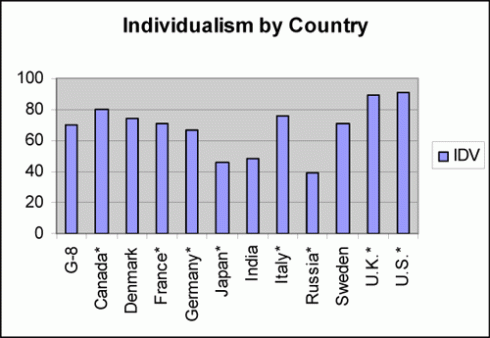Brazil vs. United States
“Power Distance, or PDI, expresses the degree to which the less powerful members of a society accept and expect that power is distributed unequally.” Brazil’s PDI is 69, which is relatively high compared to the United State’s PDI score of 40. Individualism is listed in the online Oxford Dictionary as, “A social theory favoring freedom of action for individuals over collective or state control.” Brazil scores a moderate to low 38 in this dimension, while the United States has an extremely high score of 91. The United States is considered to be the most individualistic country in the world, so it’s no wonder that their individualism score is so much higher than Brazil’s.
Hofstede’s site states that masculinity represents “a preference in society for achievement, heroism, assertiveness, and material reward for success.” Our class notes define a feminine culture, on the other hand, as emphasizing “the importance of life choices that improve intrinsic aspects of the quality of life.” Brazil is listed as a 49 for its masculinity score on Hofstede’s site, where the United States scores a 62. These scores are fairly close, with the United States being a slightly higher masculine country.
Kwintessential defines uncertainty avoidance as “measuring a country or culture’s preference for strict laws and regulations over ambiguity and risk.” Brazil scores high in the UAI dimension at 76, proving that they show a strong need for rules and laws in order to maintain a steady lifestyle. The United States scores a mild 46 in this department, which shows that our country does not rely as heavily on strict legal systems in our every day lives.
Hofstede elaborately defines long-term orientation as, “The extent to which a society shows a pragmatic future-oriented perspective rather than a conventional historical short-term point of view.” Brazil scores a high 65 in the LTO dimension compared to the United State’s weak score of 29. This shows that Brazil is a more future-oriented, long-term country, whereas the United States is much more concerned about our short-term success.
This chart shows that the United States is the most individualistic country in the world, just ahead of the United Kingdom.
As a U.S. leader or manager, I would certainly have to adjust my communication to adapt to Brazil’s culture. First and foremost, I would have to speak in more group-oriented terms. Because the United States has such a higher IDV score than Brazil, I would have to choose my words wisely. For example, if one person in the company was accomplishing twice as much as any other employee, I would try to encourage and praise the whole company rather than that one person. Or if we were talking about what we could do to save money, I would discuss different ways that the company could save money, not different ways that I could save money.
I would also have to make adjustments in the uncertainty avoidance dimension. Brazil has a much higher UAI score than the United States. If I was the boss or CEO of a Brazilian company, I could set strict rules and deadlines to show exactly how and when I want my employees to turn in their work.
Brazil is a very long-term oriented country, compared to the United State’s short-term view. As a Brazilian leader/manager, I would have to create and discuss different options that the company could save money for the future, rather than ways that the company could spend money in the present.

